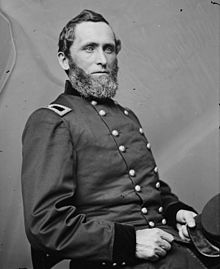Benjamin Prentiss
Benjamin Mayberry Prentiss (born November 23, 1819 in Belleville , Virginia , † February 8, 1901 in Bethany , Missouri ) was a general in the Union Army during the American Civil War .
Early life
Born in Belleville, Virginia, Prentiss was a direct descendant of Valentin Prentice, who had emigrated from England to Virginia in 1631 . Prentiss spent the first years of his life in Virginia until the family moved to Missouri and settled there near Hannibal . The family later moved to Quincy , Illinois , where Prentiss lived until 1879.
In his younger years, Prentiss worked as a rope maker and auctioneer. On March 29, 1839, he married Margaret Ann Lodousky, with whom he had seven children. After her death, he married Mary Worthington Whitney, with whom he had five other children. In 1860, Prentiss applied unsuccessfully for the Republican Party for a seat in Congress .
In the Civil War
In 1861 Prentiss was appointed regimental commander with the rank of colonel . His first job was to protect Missouri railroad lines from the Confederates . In August 1861 he was promoted to brigadier general and took command of a division in the Tennessee Army Grants . On the first day of the Battle of Shiloh , his division was suddenly attacked by the Confederates and suffered heavy losses in the first hours of the fighting. However, Prentiss managed to restore order and his division gave the Confederates a determined battle in what has become known as the Hornet's Nest. Continuing resistance from Prentiss' men gave the Tennessee Army an opportunity to rally after the surprise Confederate attack.
Surrounded by Confederate troops and cut off from the rest of the army, Prentiss finally had to surrender to the Confederates with 2,200 men. After the battle, Prentiss was celebrated as a hero, whose use and persistent resistance made Grant's counterattack on the second day of the battle and thus the victory of the Union troops possible.
After he was released in the course of a prisoner exchange, Prentiss was promoted to major general. He was then one of the judges in the court martial against General Porter . Unlike the majority of the judges, he voted against Porter's conviction. With this vote he damaged his political connections. He was posted to Arkansas , where he was commander of the Eastern Arkansas Defense District and was able to win the Battle of Helena on July 4, 1863 . In 1863 he resigned from the army because he supposedly wanted to take care of family matters. But it is also believed that he did not feel that his services were adequately appreciated in the battles of Shiloh and Helena.
After the Civil War
After the Civil War, Prentiss worked as a lawyer. In 1879 he moved to Missouri and worked there as a postmaster . This office was bestowed upon him by President Benjamin Harrison and later confirmed by William McKinley . In addition, Prentiss was the chairman of the Republican Party of Missouri. He died on February 8, 1901 in Bethany.
literature
- Daniel, Larry J., Shiloh: The Battle That Changed the Civil War , New York: Simon & Schuster, 1997, ISBN 0-684-80375-5 .
- Fowler, John D., Mountaineers in Gray: The Nineteenth Tennessee Volunteer Infantry Regiment, CSA , Nashville: University of Tennessee Press, 2004, ISBN 1-57233-314-6 .
- Warner, Ezra J., Generals in Blue: Lives of the Union Commanders , Baton Rouge: Louisiana State University Press, 1964, ISBN 0-8071-0822-7 .
See also
Web links
- Benjamin Prentiss in the database of Find a Grave (English)
| personal data | |
|---|---|
| SURNAME | Prentiss, Benjamin |
| ALTERNATIVE NAMES | Prentiss, Benjamin Mayberry |
| BRIEF DESCRIPTION | American general in the Civil War |
| DATE OF BIRTH | November 23, 1819 |
| PLACE OF BIRTH | Belleville , Virginia |
| DATE OF DEATH | February 8, 1901 |
| Place of death | Bethany , Missouri |
